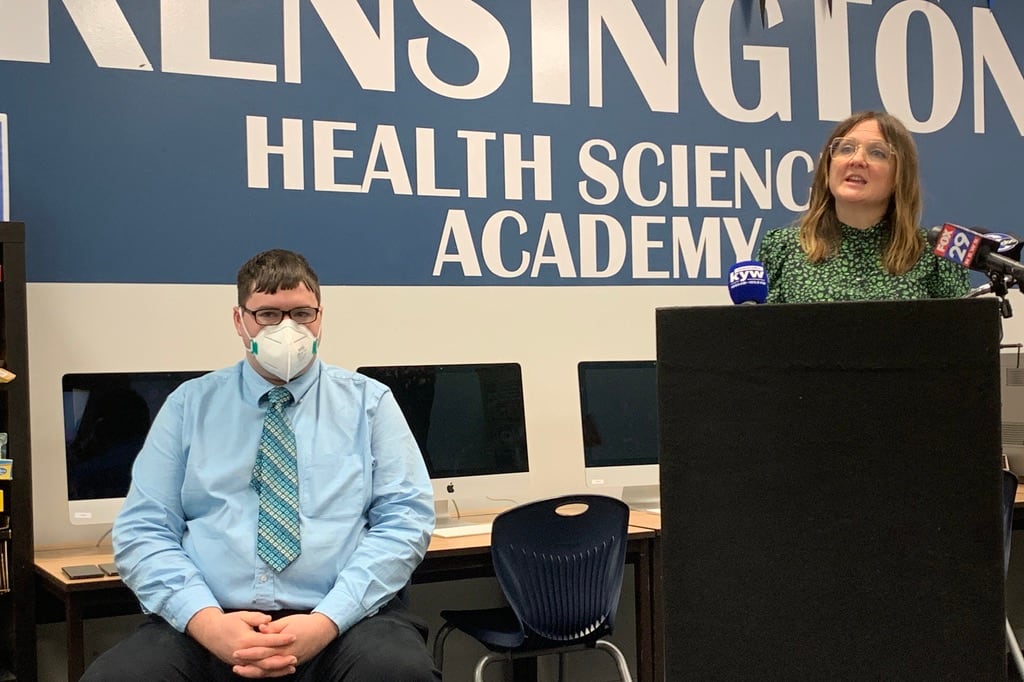Gemayel Keyes has been a special education assistant in the Philadelphia school district for 16 years. And he’s always wanted to be a teacher.
Now, he has his chance.
At its February meeting, the Philadelphia Board of Education appropriated $2.5 million for a new program that will help district paraprofessionals like Keyes complete their teachers’ certification and run their own classrooms. The money will help with tuition, fees, and other costs of completing their education and getting their certification.
“This is a wonderful program that is long overdue,” said Keyes, who is 38 and now works at Spruance Elementary School in the Northeast. “Every teacher I worked with urged me to go back to college and become a teacher.”
Through prior district programs, he was able to complete an associate’s degree at Harcum College and a bachelor’s degree at Eastern University, but he could never afford to take the time off from his job to do the required student teaching.
“(Paraprofessionals) are some of the lowest paid employees of the district,” he said. “I was at a standstill until this program came along.”
As part of its efforts to stabilize the teaching workforce, the district is offering bonuses across the board, and has started its hiring process for the 2022-23 school year earlier than it typically does. (The district will make its first offers to prospective teachers next week.)
But the district has also long sought to bring into the profession people who come to teaching as a second career, or through non-traditional routes. Most graduates of traditional teacher education programs are women, and the district sees the new program focused on paraprofessionals as a way to attract more men and more people of color.
“The goal is to have a more diverse teaching force and to open doors to those who are not from graduate schools of education,” said district Chief Talent Officer Larisa Shambaugh, during a Thursday press conference at Kensington Health Sciences Academy highlighting the paraprofessionals program.
The district did not provide an estimate of how many paraprofessionals will be able to participate in the program. Depending on the person’s level of education, a paraprofessional who joins the program will attend one of four local partner universities: Temple, Cheyney, LaSalle, and Drexel.
The district negotiated the program’s creation with the Philadelphia Federation of Teachers as part of its current contract. The union also represents the paraprofessionals.
The district already has teacher residency programs seeking to attract non-traditional candidates with Drexel, Temple, and other organizations. And some paraprofessionals have already taken advantage of those opportunities.
Christopher Rocks knew from when he was young that he wanted to work with special needs students. When he graduated from Holy Family College, he got a job as a special education assistant at Greenberg Elementary and now is getting his teaching certification at Temple University.
Rocks, who spoke at the press conference, is doing his student teaching at Mayfair Elementary School, in the neighborhood where he grew up.
“I was surprised how similar being a teacher is to being a (paraprofessional),” he said. “I was expecting a whole different role but it is similar in how you support students.”
With about 9,300 teaching positions in the district, Shambaugh said that the district will need to hire at least 900 teachers for the upcoming school year, a relatively normal number despite a mid-year exodus this year as schools continued to deal with the fallout from the pandemic. (The full need will not be known until after schools complete their budgets for 2022-23.)
Shambaugh said that the district started the school year with 98% of teaching positions filled, a number that’s dipped to 96.5%; there are now 300 teaching vacancies in 220 schools.
As an incentive for staff to stay, teachers in 50 schools with historically high staff turnover rates will get $5,000 in bonuses – $2,500 in June 2023 and another $2,500 in September 2024. The district also negotiated these bonuses with the teachers’ union.
The program for paraprofessionals “is something the PFT leadership team prioritized during negotiations, as a direct result of our members indicating it is a priority,” said union spokesperson Hillary Linardopoulos in an interview. A joint district-union committee is working on developing the program. “The goal is to make it accessible for members pursuing higher degrees,” she said.
Kensington Health Sciences teacher Jenifer Felix made an impassioned plea for people to teach in Philadelphia.
“It’s important for people who really believe in the mission of a teacher … who really believes in education and the potential of our children, the specific children we teach, they really do have the ability to succeed,” Felix said.
Keyes said that people who already work with children in the city know this.
“With this program, they’re finally stepping up to the plate and recognizing the talent we already have in the district,” Keyes said. “We (paraprofessionals) will become teachers, we’ll stay teachers. We know the communities, the schools, the children, and we’re equipped to do the job. But we needed a little extra help.”
Dale Mezzacappa is a senior writer for Chalkbeat Philadelphia, where she covers K-12 schools and early childhood education in the city. She is a former president of the Education Writers Association. Contact Dale at dmezzacappa@chalkbeat.org.






